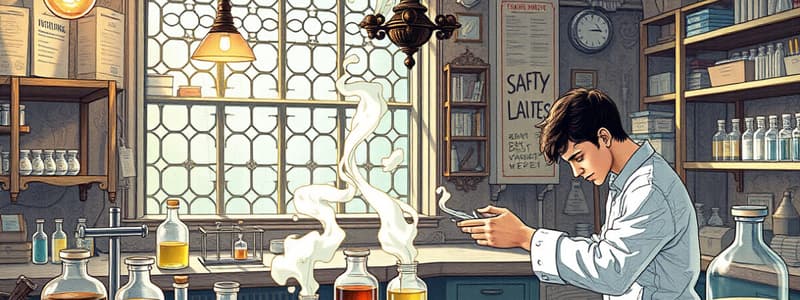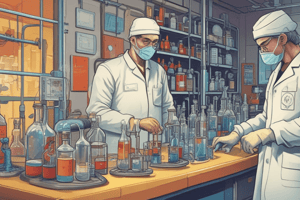Podcast
Questions and Answers
What type of clothing should be avoided in the laboratory?
What type of clothing should be avoided in the laboratory?
- Safety goggles
- Loose fitting clothing (correct)
- Laboratory aprons
- Tight fitting clothing
What should you do if you do not understand the procedure before beginning the lab?
What should you do if you do not understand the procedure before beginning the lab?
- Ask your classmates
- Ask the teacher for clarification (correct)
- Consult the laboratory manual
- Attempt the experiment anyway
Which of the following items is acceptable to bring into the laboratory?
Which of the following items is acceptable to bring into the laboratory?
- Your backpack
- A jacket
- A notebook (correct)
- Food for a snack
What should you do immediately after a spill in the lab?
What should you do immediately after a spill in the lab?
When should safety goggles be worn in the laboratory?
When should safety goggles be worn in the laboratory?
Which of the following actions is prohibited in the laboratory?
Which of the following actions is prohibited in the laboratory?
What is the correct procedure if you need to dispose of unused chemicals?
What is the correct procedure if you need to dispose of unused chemicals?
What should be done at the end of a lab period?
What should be done at the end of a lab period?
What is the proper footwear for working in a laboratory?
What is the proper footwear for working in a laboratory?
What is the primary reason for not eating or drinking in the laboratory?
What is the primary reason for not eating or drinking in the laboratory?
Flashcards are hidden until you start studying
Study Notes
Laboratory Safety Rules
- Personal Protective Equipment (PPE): Always wear laboratory aprons and safety glasses as instructed. Goggles are mandatory when working with flames, chemicals, or mechanical devices.
- Responsible Behavior: No horseplay, rough play, or practical jokes are allowed, as they pose safety risks and are strictly prohibited.
- Work Environment: Never work alone in the laboratory to ensure assistance in case of emergencies.
- Equipment Handling: Do not touch equipment, chemicals, or materials in the lab upon entry until given instructions.
- Personal Items Policy: Bring only necessary materials (books, notebooks, pens) into the lab. Leave personal items like bags and jackets in the designated area.
- Authorized Experiments Only: Perform only experiments authorized by the teacher or lab handouts; strictly follow provided directions.
- Footwear and Clothing: Shoes are required in the lab, avoid loose clothing, and remove any dangling jewelry to prevent accidents.
- No Food or Drink: Eating, drinking, or chewing gum is not permitted in the lab to maintain a safe environment.
- Laboratory Glassware: Never drink from laboratory glassware or mix, touch, taste, heat, or inhale chemicals unless instructed.
- Preparation: Read experimental procedures thoroughly before starting, noting any hazards. If unclear, consult the teacher for clarification.
- Spill and Accident Reporting: Report spills or accidents to the instructor immediately for proper handling, regardless of their severity.
- Open Flame Safety: When using flames, tie back long hair, roll up loose sleeves, and wear safety goggles to minimize risks.
- Glassware Integrity: Avoid using chipped, cracked, or broken glassware to prevent accidents and ensure safety.
- Electrical Safety: Keep electrical cords organized and avoid dangling cords to minimize tripping hazards.
- Equipment Shutdown: Ensure all gas jets, electrical connections, and water faucets are turned off at the end of the lab session.
- Hygiene: Wash hands with soap and water thoroughly before leaving the lab to prevent contamination.
- Chemical Disposal: Do not return unused chemicals to original containers; dispose of them properly to avoid contamination.
Studying That Suits You
Use AI to generate personalized quizzes and flashcards to suit your learning preferences.




